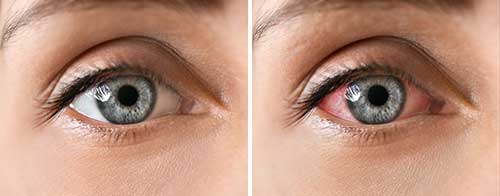Conjunctivitis (Pink Eye)
Conjunctivitis is the term used by Ophthalmologists to describe inflammation of the conjunctiva. In ordinary terms, conjunctivitis is the most common cause of “pink eye”. The white portion of the eye (sclera) is covered by a thin, filmy membrane called the conjuctiva which produces mucus to coat and lubricate the surface of the eye. It normally has fine blood vessels within it, which can be seen upon close inspection. When the conjunctiva becomes irritated or inflamed, the blood vessels which supply it enlarge and become much more prominent, and the eye turns red.
 Many different sources of eye irritation can cause conjunctivitis. The most common are:
Many different sources of eye irritation can cause conjunctivitis. The most common are:
- Infections (viral or bacterial)
- Allergies (including eye medications)
- Environmental irritants
Viruses are the most common causes of conjunctivitis. Some viruses produce the familiar red eyes, sore throat and runny nose of a common cold. Other may infect only one eye. Viral conjunctivitis usually produces water discharge that can last from one to two weeks.
Bacterial infections such as staphylococcus or streptococcus, cause pink eye which is associated with a considerable amount of pus. If the discharge from the eye is in excess, an acute infection is likely, and you should contact your Ophthalmologist. On the other hand, some bacterial infections are more chronic and may produce little to no discharge except for some mild crusting of the eyelashes in the morning.
Infectious conjunctivitis, whether bacterial or viral, can be extremely contagious, so contact with the patient’s tears through used handkerchiefs and towels should be avoided. Hand washing after contact with the eye helps to prevent the spreading of the infection.
Treatments
Treatment depends on the cause of the conjunctivitis. For allergy induced cases the treatment is geared towards making the eye more comfortable with artificial tears and cool compresses. For bacterial conjunctivitis antibiotics are usually prescribed and in severe cases a culture may be necessary. For allergic causes, ophthalmic antihistamines, and/or steroid eye drops may be prescribed.
Experience You Can See
Thibodaux : 985-446-0506 | Houma : 985-879-2393
